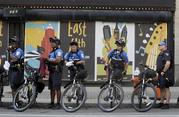- California Assembly OKs highest minimum wage in nation
- S. Korea unveils first graphic cigarette warnings
- US joins with South Korea, Japan in bid to deter North Korea
- LPGA golfer Chun In-gee finally back in action
- S. Korea won’t be top seed in final World Cup qualification round
- US men’s soccer misses 2nd straight Olympics
- US back on track in qualifying with 4-0 win over Guatemala
- High-intensity workout injuries spawn cottage industry
- CDC expands range of Zika mosquitoes into parts of Northeast
- Who knew? ‘The Walking Dead’ is helping families connect
CLEVELAND POLICE ARE RELYING HEAVILY ON BIKE PATROLS
CLEVELAND (AP) — Cleveland police trying to keep protests from turning violent during the Republican convention are relying heavily on officers on bikes, who are not only more maneuverable but are seen as friendlier and less intimidating. 
Police Chief Calvin Williams said the city bought 300 bicycles for the event on the advice of the police in Charlotte, North Carolina, which hosted the 2012 Democratic convention. Officers on loan from more than a dozen police departments are on bike patrol in the city, he said.
“Getting around town is a lot easier and a lot faster,” Williams said. “The tactics they use for crowd management and to monitor and assist for protests, you can’t do it on foot, can’t do it in vehicles.”
The bikes also offer a less tangible benefit: making officers more approachable.
“The bicycle breaks down all kinds of barriers,” said Maureen Becker, executive director of the International Police Mountain Bike Association. “It’s a catalyst for conversation. It is less intimidating than some other types of vehicles. And most people can relate in some way shape form to being on a bicycle.”
Tensions between police and the public have been running high over the past two weeks. Two black men were shot to death by police in Louisiana and Minnesota, and eight officers were killed in two ambushes in Dallas and Baton Rouge, Louisiana. Many officers are on edge.
The bike patrols have been a common sight around Cleveland in the past few days, with officers riding black bicycles and wearing black helmets and shorts. Some wear armored vests over their uniforms, while others have protective gear on underneath their shirts.
During an event Monday evening, about 100 bike officers wheeled slowly around the Public Square in a long black line.
One Cleveland police officer, who spoke on condition of anonymity because is not supposed to talk to the media, said the bikes are perfect for an area with closed streets and multiple incidents to respond to.
“With the road bike, the ease of getting around is just exponentially higher than any other vehicle,” he said. He said he doesn’t feel vulnerable, since he wears an armored vest and is so mobile.
“I feel safer on a bike because I can get away and take cover,” he said.
Law enforcement agencies nationwide began re-evaluating how they respond to protests after officers with military-style gear clashed with demonstrators in 2014 in Ferguson, Missouri, over the police shooting of Michael Brown. A Justice Department report found that the equipment “produced a negative public reaction” in the community.
Political conventions saw the first use of officers on bikes in 2000 in Philadelphia and Los Angeles, with the use expanding considerably over the years, Becker said.
Tiger Mountain Tactical, a company that provides crowd-control instruction for police cyclists, sent several bicycle officers from the Seattle area to Cleveland to help with training.
Officers must complete a 32-hour training class before they can join a bike unit, said Steve Kensinger, a police officer in Madison, Ohio, who trained 80 officers from northern Ohio for the convention.
“It’s intense. Not everyone passes,” he said.
Officers on bikes can maneuver quickly through crowds and get into parks and alleys inaccessible by car. The bicycles can also be used to separate protest groups, as was done briefly in Cleveland on Monday.
“The beauty of the bike is that when you hold it forward and turn it sideways, it becomes a barrier,” said Thor Eells, chairman with the National Tactical Officers Association and a commander with the police department in Colorado Springs, Colorado.











